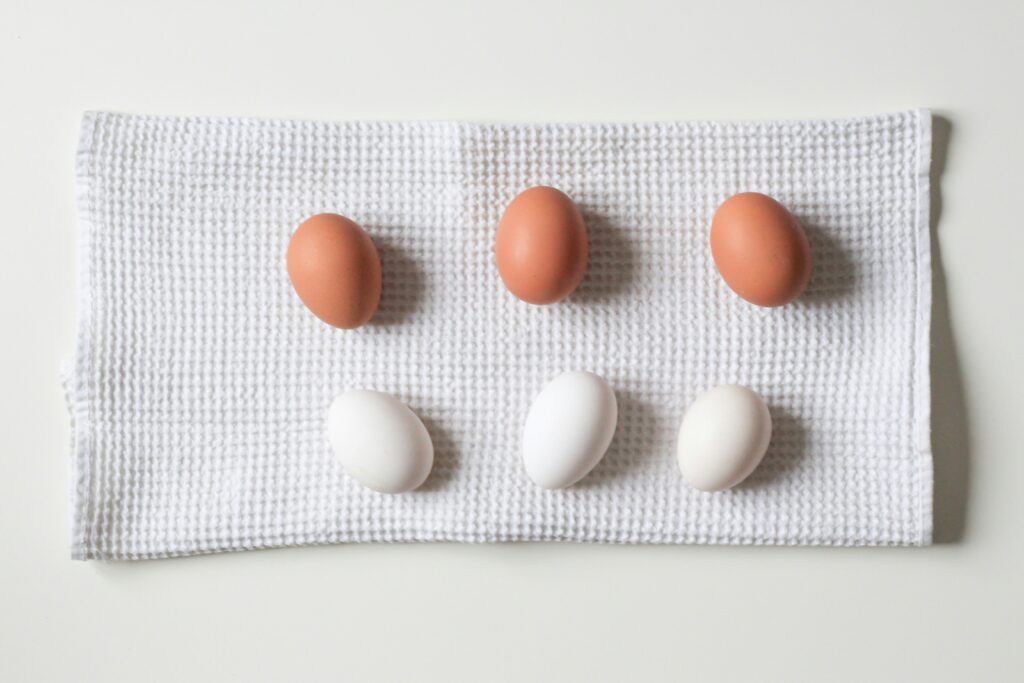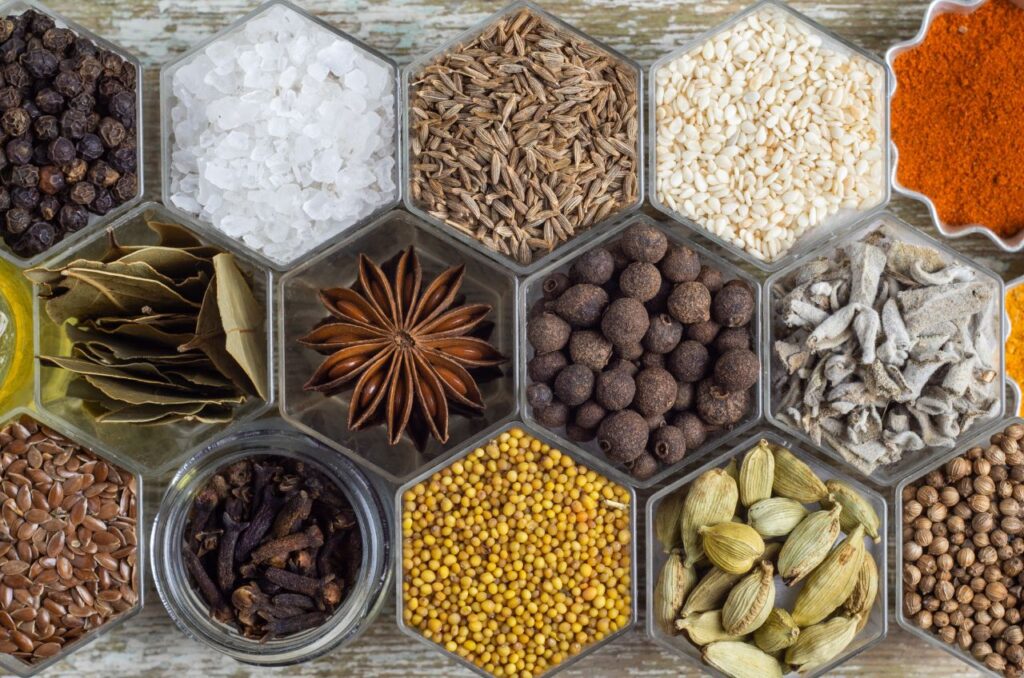
Foods That Help Balance Hormones – Nutritional Gems During Menopause
Are there foods that help balance hormones? Can you truly help restore balance just by eating? Absolutely!
And I’m going to show you how.
In this article, we’ll be looking at the best foods that help balance hormones. That way, you can create a shopping list that suits both your taste and your nutritional needs.
Plus, we’ll take a look at the types of food that cause hormone imbalances so you can stay clear of them.
Ready to restore balance? (Not to the force – just to your hormones!)
Let’s get stuck in.
Last Updated:
Which hormones are impacted by menopause and perimenopause?
Before we look at foods that help balance hormones, let’s first answer a question that underpins everything – your symptoms, your experience and your relationship with your menopause journey:
What happens to your hormones during menopause?
There are a whole range of hormones that are involved in the menopause and perimenopause.
The main hormones which are impacted include:
- Oestrogen
- Progesterone
- Testosterone
While these are the three main players, follicle-stimulating hormones (FSH) and luteinising hormone (LH) also adjust during perimenopause and menopause.
When hormone levels are knocked off-kilter, side effects can show up. Everyone’s different and their experience will be unique. From severity to the types of symptoms to even how long they last.
Symptoms like hot flashes, sleep disturbance, mood swings and menopause anxiety are just some of many.
How certain foods that help balance hormones can reduce your menopause symptoms
Nutrition is a power-play when it comes to hormone balance. So, can a healthy diet really help with menopause symptoms?
The simple answer? Yes. There’s a reason why so many women discover that their menopause symptoms can improve by making a few strategic and simple adjustments to their diet.
Of course, it’s important to know that food plays only one role. You should also consider lifestyle changes to help balance hormones and improve general wellbeing, such as routine exercise, staying hydrated and reducing (or quitting) caffeine.
Foods that help balance hormones
It’s undeniable that nutrition can change everything. However, to see a real difference, you’ll need to be consistent and give it enough time.
So, let’s take a look at the foods that help balance hormones so you can lessen the severity of your menopause symptoms.
1. Eat high quality protein in every meal
Protein keeps feeling fuller for longer, filling us up. That’s why protein is so key for weight loss.
Protein also keeps our blood sugar levels balanced. During menopause and perimenopause, the changes to your hormones can have a domino effect on your blood sugar levels. That’s why some women are at a higher risk of developing type 2 diabetes.
Specialists recommend consuming 1-2g of protein per kilogram of body weight.
Foods high in protein
You should try to incorporate protein – whether that’s animal or plant protein – into each meal.
Foods high in protein include:
- Eggs
- Yoghurt
- Milk
- Chicken
- Turkey
- Fish and seafood (particularly salmon)
- Nuts and seeds (particularly pistachios)
- Pork
- Tofu
- Beans and pulses (particularly lentils and chickpeas)

2. Cruciferous vegetables
We all know vegetables are good for us, but did you know that some vegetables are foods that help balance hormones?
These are cruciferous vegetables and are part of the brassica family. When cruciferous vegetables are chopped, cooked and chewed, something called Indole-3-carbinol is produced.
Don’t worry if you have no idea what that means.
All you need to know is that indole-3-carbinol helps with liver function, which is important to balance our hormones as it’s where waste and unnecessary hormones are cleared out.
Examples of cruciferous vegetables
Now that you know cruciferous vegetables are super-heroes, add these to your shopping list:
- Kale
- Broccoli
- Brussels sprouts
- Cabbage
- Cauliflower
- Bok choy
- Radish
- Rocket
3. Foods with good fats
Fats aren’t always a bad thing when it comes to nutrition. It’s about knowing the difference between good and bad fat.
“Bad fats” are made of saturated fat and trans fat. They’re bad because they raise your cholesterol levels, which can lead to an increased risk of stroke, heart attack and vascular dementia.
On the other hand, good fat plays a huge role when it comes to hormone production. They help build them and help with inflammation. That’s why consuming good fats is always recommended to anyone experiencing menopause bloating.
Examples of foods with good fats
When it comes to fats in food, it can be tricky to know which is good and which isn’t. So, use this list of the right type of fats:
- Certain cooking oils
- Rapeseed oil
- Sunflower oil
- Corn oil
- Flaxseed oil
- Peanut butter
- Avocado
- Nuts or seeds (but make sure they are unsalted and raw)
- Almonds
- Cashews
- Hazelnuts
- Peanuts
- Pistachios
- Nut butter
- Oily fish
- KippersSalmonMackerel
4. Wholegrain carbohydrates high in fibre
Wholegrain carbohydrates are full of fibre and B vitamins. They work in tandem to help balance out your hormone levels and get rid of any spent hormones. This is particularly useful in perimenopause, when you’re still getting periods. Even more so if you have conditions like PMS or endometriosis.
Best wholegrain carbohydrates for hormone balance
You should aim for a fist-sized portion when it comes to any wholegrain carbohydrates. These slow-release nutritional gems can include:
- Quinoa
- Brown rice
- Oats
- Buckwheat
5. Herbs and spices
Not only do herbs and spices add more flavour to any meal, many have anti-inflammatory properties. Whether you choose to add fresh or dried herbs to your meals, you’ll be creating a dish to help restore harmony to your hormones.
The best herbs and spices for hormone balance
Herbs have always had an impact on female health and hormone balance. So, try to create recipes that make use of the following herbs and spices:
- Ginger
- Turmeric
- Paprika
- Garlic
- Sumac

6. Ground flaxseeds
Flaxseeds are nutritional power-houses. They’re a great source of lignans, which helps to balance out oestrogen levels.
In perimenopause and menopause, your oestrogen levels are dramatically knocked off-balance, so boosting your intake of flaxseeds will really help reduce the severity of your symptoms.
How many flaxseeds should I eat for hormone balance?
Get into the routine of consuming 2 tablespoons of flaxseeds every day.
You don’t have to eat them directly off the spoon, though. Flaxseeds are pretty versatile.
Sprinkle them over your breakfast, blend them in a smoothie (like my Berry Smoothie) or add them as garnish to a soup.
7. Foods rich in magnesium
Magnesium is great for insulin sensitivity. Remember, blood sugar levels can often change during perimenopause and menopause because of the difference in our hormone levels.
Magnesium is also well-versed in regulating your nervous system, which helps with mood swings brought on by falling oestrogen levels.
Best foods that are rich in magnesium for hormone balance
There are many foods that help balance hormones. The ones including magnesium are among the easiest to implement into daily life:
- Avocados
- Leafy green vegetables
- Spinach
- Kale
- Collard greens
- Watercress
- Rocket
- Legumes
- Chickpeas
- Lentils
- Soy beans
- Butter beans
- Haricot beans
- Tofu
- Nuts and seeds
- Brazil nuts
- Cashew nuts
- Almonds
- Pine nuts
- Sunflower seeds
- Pumpkin seeds
- Wholegrains
- Quinoa
8. Microbiome rich foods
To make sure our bodies are producing hormones and keeping them balanced, we need to protect our gut. Gut bacteria is absolutely fundamental to hormonal health and will help reduce the severity of menopause symptoms.
How to feed your gut microbiome
You can look after your gut by eating the following foods:
- Fermented foods
- Olives
- Fermented vegetables (pickles, for example)
- Kefir
- Prebiotic foods and yoghurts
- Vegetables
- Leeks and onions
- Asparagus
- Spinach
- Artichokes
- Broccoli
- Fruits
- Apples
- Berries
- Bananas
- Mango
- Healthier sweet foods
- Honey
- Dark chocolate
- Beans and pulses
- Lentils
- Chickpeas
- Swap caffeinated drinks for green tea

Clearly, there are a number of foods that help balance hormones. With so many different foods, you can create a menopause diet plan that suits your taste and helps to balance your hormones and reduce your symptoms.
As a nutritionist myself, I’m a firm believer in not needing to compromise between the enjoyment food brings and the way it can revolutionise your symptoms.
Foods that cause hormone imbalances
You now know which foods you should eat, but what about foods you shouldn’t eat?
To avoid further hormone imbalance, stay clear of the following foods.
Eating too much red meat
I’m not saying you need to cut red meat out of your diet entirely. As is the case for so many things in nutrition, it’s all about a healthy balance and moderation.
Red meat isn’t great for you because it’s high in saturated and hydrogenated fats (the bad types.)
If you eat too much red meat, your oestrogen levels will rise. If your other hormones aren’t at the right ratio, it can cause symptoms to worsen.
Instead of red meat, try to eat more fish like salmon and tuna or poultry like turkey or chicken breast.
Caffeine consumption
Caffeine can cause pure mayhem when it comes to menopause and perimenopause.
One of the more common menopause and perimenopause symptoms is sleep disruption and insomnia. If you’re consuming caffeine, you’re heavily increasing the odds of a bad night’s sleep.
Whether you’re drinking coffee, tea or energy drinks, caffeine will impact your sleeping cycle. Plus, caffeine will interfere with your hormonal balance.
When you consume caffeine, your body releases more cortisol – the stress hormone – to wake you up. That knocks your hormones off balance.
Instead, opt for a herbal tea or, if you’re struggling to give up your morning drink, choose the decaf alternative.
Eating processed foods
Highly processed and refined foods aren’t good for you. That’s not exactly breaking news, but if you’re struggling with a hormone imbalance that has been brought on by perimenopause and menopause, it’s more important than ever to stay clear of these types of foods.
Processed foods are high in salt, sugar and preservatives. When you eat them, your hormones are impacted because of inflammation and stress, sent to your adrenal glands.
Of course, the most common side effect of eating too many processed foods is weight gain. Hormone imbalance is just as common, though. So, if you’re trying to restore hormonal harmony, it’s time to ditch the processed foods.
Foods that help balance hormones – in a nutshell
Perimenopause and menopause bring along with them a huge change to hormone levels.
This can cause many different types of symptoms which can be challenging to live with. The good news is that these symptoms can be controlled and minimised by eating foods that help balance hormones.
From high-quality protein and good fats to ground flaxseeds and magnesium-dense foods, there’s such an array of ingredients that’ll help battle the imbalance.
This week, take some of the foods that help balance hormones from our list and cook up a storm.
I guarantee you’ll feel the difference.
Share this article with someone who would find it useful and let’s all eat more strategically for happy, healthy (and balanced) hormones.
Leave a Reply
- free ebook alert -
WHAT TO EXPECT WHEN YOU’RE
going through the menopause
Demystify your understanding of what’s happening to you. Arm yourself with solid, game-changing information to support you through this challenging phase of your life.
grab your copy now →
WHAT TO EXPECT WHEN YOU’RE
going through the menopause
During menopause and perimenopause, shifts in hormones like oestrogen, progesterone, and testosterone can bring a range of symptoms from hot flashes to mood changes. Supporting your body with balanced nutrition can help ease this transition. Learn more about food choices that support hormonal health here: https://www.shemed.co.uk/blog/understanding-the-glycaemic-index-gi-for-better-food-choices